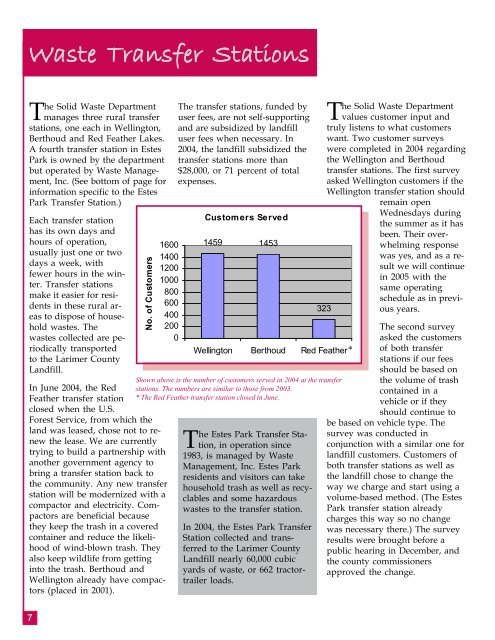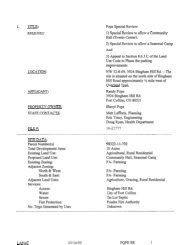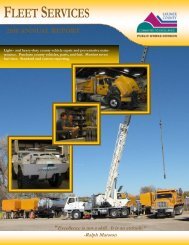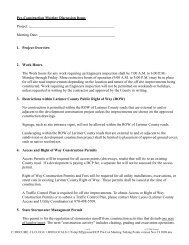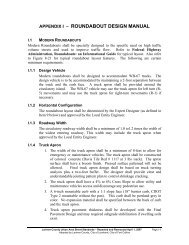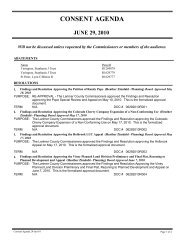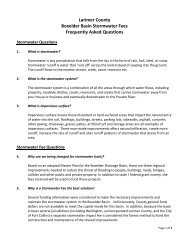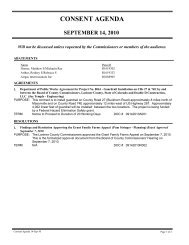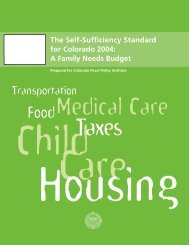Larimer County Solid Waste Department - About Larimer County
Larimer County Solid Waste Department - About Larimer County
Larimer County Solid Waste Department - About Larimer County
Create successful ePaper yourself
Turn your PDF publications into a flip-book with our unique Google optimized e-Paper software.
<strong>Waste</strong> <strong>Waste</strong> Transfer Transfer Stations<br />
Stations<br />
The <strong>Solid</strong> <strong>Waste</strong> <strong>Department</strong><br />
manages three rural transfer<br />
stations, one each in Wellington,<br />
Berthoud and Red Feather Lakes.<br />
A fourth transfer station in Estes<br />
Park is owned by the department<br />
but operated by <strong>Waste</strong> Management,<br />
Inc. (See bottom of page for<br />
information specific to the Estes<br />
Park Transfer Station.)<br />
Each transfer station<br />
has its own days and<br />
hours of operation,<br />
usually just one or two<br />
days a week, with<br />
fewer hours in the winter.<br />
Transfer stations<br />
make it easier for residents<br />
in these rural areas<br />
to dispose of household<br />
wastes. The<br />
wastes collected are periodically<br />
transported<br />
to the <strong>Larimer</strong> <strong>County</strong><br />
Landfill.<br />
In June 2004, the Red<br />
Feather transfer station<br />
closed when the U.S.<br />
Forest Service, from which the<br />
land was leased, chose not to renew<br />
the lease. We are currently<br />
trying to build a partnership with<br />
another government agency to<br />
bring a transfer station back to<br />
the community. Any new transfer<br />
station will be modernized with a<br />
compactor and electricity. Compactors<br />
are beneficial because<br />
they keep the trash in a covered<br />
container and reduce the likelihood<br />
of wind-blown trash. They<br />
also keep wildlife from getting<br />
into the trash. Berthoud and<br />
Wellington already have compactors<br />
(placed in 2001).<br />
7<br />
No. of Customers<br />
1600<br />
1400<br />
1200<br />
1000<br />
800<br />
600<br />
400<br />
200<br />
0<br />
The transfer stations, funded by<br />
user fees, are not self-supporting<br />
and are subsidized by landfill<br />
user fees when necessary. In<br />
2004, the landfill subsidized the<br />
transfer stations more than<br />
$28,000, or 71 percent of total<br />
expenses.<br />
Customers Served<br />
1459 1453<br />
Wellington Berthoud Red Feather*<br />
Shown above is the number of customers served in 2004 at the transfer<br />
stations. The numbers are similar to those from 2003.<br />
* The Red Feather transfer station closed in June.<br />
The Estes Park Transfer Station,<br />
in operation since<br />
1983, is managed by <strong>Waste</strong><br />
Management, Inc. Estes Park<br />
residents and visitors can take<br />
household trash as well as recyclables<br />
and some hazardous<br />
wastes to the transfer station.<br />
In 2004, the Estes Park Transfer<br />
Station collected and transferred<br />
to the <strong>Larimer</strong> <strong>County</strong><br />
Landfill nearly 60,000 cubic<br />
yards of waste, or 662 tractortrailer<br />
loads.<br />
The <strong>Solid</strong> <strong>Waste</strong> <strong>Department</strong><br />
values customer input and<br />
truly listens to what customers<br />
want. Two customer surveys<br />
were completed in 2004 regarding<br />
the Wellington and Berthoud<br />
transfer stations. The first survey<br />
asked Wellington customers if the<br />
Wellington transfer station should<br />
remain open<br />
Wednesdays during<br />
the summer as it has<br />
been. Their overwhelming<br />
response<br />
was yes, and as a result<br />
we will continue<br />
in 2005 with the<br />
same operating<br />
schedule as in previ-<br />
323<br />
ous years.<br />
The second survey<br />
asked the customers<br />
of both transfer<br />
stations if our fees<br />
should be based on<br />
the volume of trash<br />
contained in a<br />
vehicle or if they<br />
should continue to<br />
be based on vehicle type. The<br />
survey was conducted in<br />
conjunction with a similar one for<br />
landfill customers. Customers of<br />
both transfer stations as well as<br />
the landfill chose to change the<br />
way we charge and start using a<br />
volume-based method. (The Estes<br />
Park transfer station already<br />
charges this way so no change<br />
was necessary there.) The survey<br />
results were brought before a<br />
public hearing in December, and<br />
the county commissioners<br />
approved the change.


